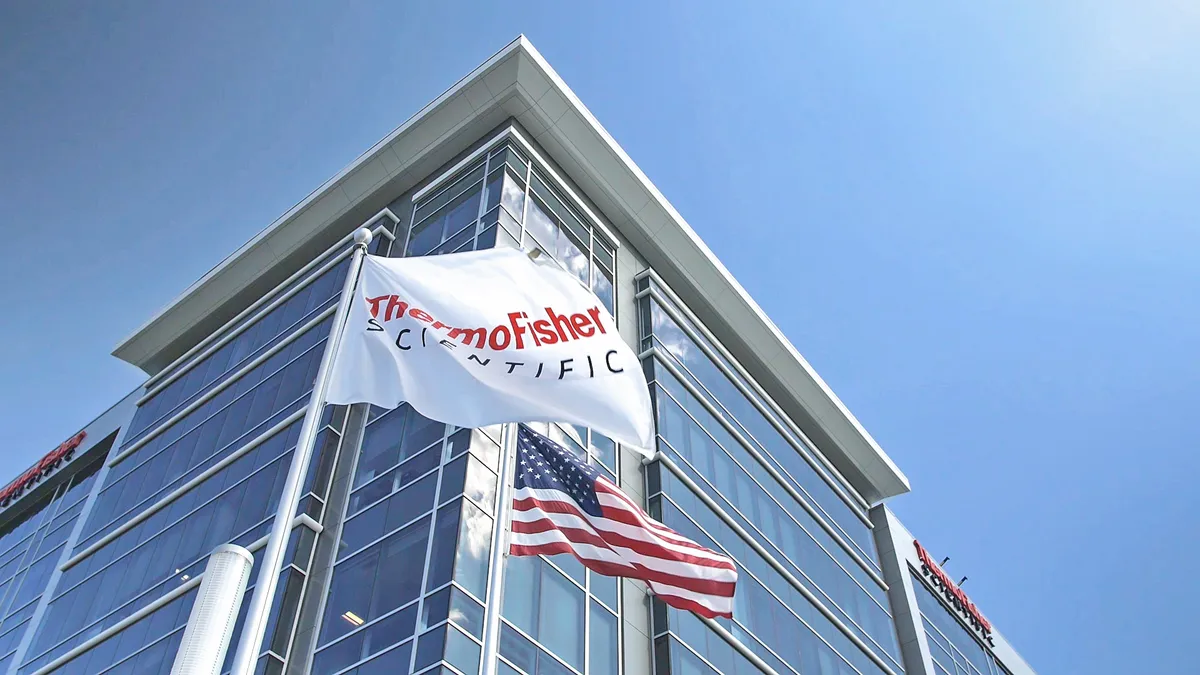Dive Brief:
- Both Thermo Fisher Scientific and Hologic raised their revenue expectations for 2022 as the omicron surge has stirred up demand for COVID-19 testing. Thermo Fisher boosted its revenue guidance for next year to $42 billion, a $1.5 billion increase. And Hologic now expects to bring in $4.4 billion to $4.5 billion for its fiscal year 2022, a $600 million increase from previous estimates.
- Shortages of semiconductors and other key components are also affecting the sector. Hologic expects it will affect shipments of mammography and imaging devices, anticipating a $200 million hit to revenue as a result.
- Both companies expect that PCR testing will play an ongoing role in the future. Thermo Fisher is forecasting roughly $100 million in revenue per quarter from testing when COVID-19 becomes "endemic."
Dive Insight:
It's difficult to predict what the next few months will hold, but executives of both Thermo Fisher and Hologic are planning for COVID-19 testing to continue to play a role. Both companies beat Wall Street's expectations for the quarter ending December 31, as the omicron variant drove a surge in COVID-19 cases, and at the same time, testing demand.
Thermo Fisher brought in $10.7 billion in revenue in the fourth quarter of 2021, flat compared to 2020. Roughly $2.5 billion of that was related to its COVID-19 response.
For the full year, Thermo Fisher's revenue increased 22% to $39.2 billion.
Hologic, too, saw stronger-than-expected demand for tests. The Marlborough, Mass.-based company brought in roughly $1.5 billion in revenue for the quarter. While this mark was down 9% from 2020, it still beat Wall Street's expectations of just over $1 billion in revenue.
Testing money aside, Hologic's core business is growing. Carving out COVID-19-related sales, it would have seen its quarterly revenue increase 9%.
Even as the latest surge of cases starts to abate in some countries, both companies are forecasting a continuing need for PCR tests.
Thermo Fisher is boosting its guidance for next year to assume $1.75 billion in testing revenue, though there are scenarios where testing demand could be higher, CFO Stephen Willamson said during a Wednesday earnings call. The company expects most of that will come in the first half of 2022, while assuming roughly $100 million in revenue per quarter should cases stabilize.
Hologic now has an installed base of more than 3,000 Panther testing systems, a 75% increase from before the pandemic. Most of its customers are already running other assays on the system besides COVID-19.
"If you go back two years ago, none of us would have imagined we'd be having the amount of testing going on now," Hologic CEO Stephen MacMillan told investors Wednesday. "At the end of the day, most governments, most people around the globe realized while there's antigen testing out there, for true population health and frankly to truly capture what's going on, molecular is the answer. We feel better and better that this is going to be an ongoing part of our business for many, many years."
That said, shortages of semiconductors and other materials are slowing down other aspects of Hologic's business.
CFO Karleen Oberton said the company is expecting a temporary supply shortage of chips that will lengthen delivery timelines for its mammography systems. For now, Hologic is reserving a portion of its chips for existing service, rather than new devices. The company expects about $200 million in revenue will be pushed out of its 2022 fiscal year due to supply chain challenges.
While that might have been a "sizeable knockdown punch" a few years ago, MacMillan said, it's now an annoyance that the company will work through. Analysts with William Blair also brushed off the potential delayed revenue.
"In fact, the 'delay' of this revenue into the next fiscal year will only offer more favorable comps in what could be a tough year depending on COVID-19 testing dynamics," they wrote in a research note.
If there's any other indication of the company's growth, Hologic plans to debut a Super Bowl ad featuring singer Mary J. Blige. Although medtech companies historically haven't advertised as much to consumers, it's the second company to feature a commercial in the big game, after Dexcom bought an ad last year.
NBC is reportedly charging upwards of $6 million for 30 seconds of airtime during this year's Super Bowl, with some buyers spending as much as $7 million.











